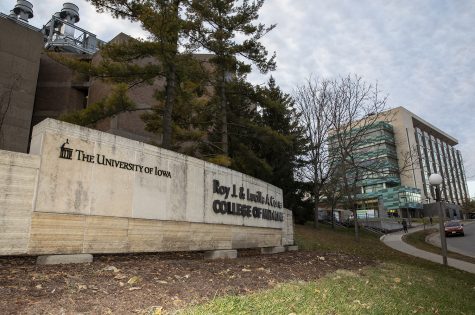Guest Opinion: Young Iowans need clean water
More government funding and action are needed to keep Iowa’s water from becoming overly polluted.
The Old Capitol building is seen in 2018.
September 15, 2019
Over the past few years, Iowa’s water quality has become a matter of debate. While the science points to nutrient pollution (primarily nitrogen and phosphorus runoff) negatively impacting recreational and drinking water quality around the state, state leaders are choosing to ignore these facts and claim that our water is fine.
As an Iowa native and a recent graduate of a public Iowa university, the Legislature’s denial of important environmental issues is one of the reasons I’m considering leaving the state. I love Iowa, but I want to see the state’s leadership acknowledge the shortcomings and take positive steps toward addressing its issues.
I’ve seen Iowa grow positively — just look to Des Moines for a wonderful example of the modernization the state has gone through. Yet, the undeniable water issues — and lack of meaningful progress — show that Iowa isn’t interested in preserving the state’s natural resources for future generations.
While there have been multiple attempts at changing our water protections, such as the implementation of the Nutrient Reduction Strategy to the creation the Natural Resources and Outdoor Recreation Trust Fund, little has been done to actually fund the programs that would help clean up our waterways or incentivize behavior change at the scale necessary to tackle the scope of the nutrient pollution problem in Iowa.
Recently, Gov. Kim Reynolds launched “This is Iowa,” a campaign aimed at recruiting people, particularly young professionals, to consider Iowa for their next home. One of the heavily emphasized areas of the campaign is Iowa’s great recreational activities, specifically water-based recreation. Having grown up in Clear Lake, I know firsthand that Iowa has some wonderful recreational opportunities.
But it is disingenuous for the current administration to take credit for these resources, considering the lack of serious policy proposals aimed at supporting water quality and outdoor recreation. For instance, after a decade, the conservation trust has yet to be funded despite the democratic will of Iowans. As someone who grew up in a recreational lake community, I also understand the economic toll it can take on small businesses and the community when people choose not to vacation due to poor water quality and harmful algae blooms.
With numerous microcystin and E. coli warnings at our state beaches, it’s hard to imagine inviting people in for a swim, let alone inviting young people to move or stay based on these impaired resources.
Brain drain is already a concern in Iowa, and ignoring environmental issues is not helping the problem. It’s not hard to see why many of my peers are choosing to move to places such as Minneapolis and Denver. Natural beauty and outdoor recreation are important to overall quality of life, and this is a factor we consider in choosing a place to settle down. By actually following through on its promises to keep our environment and our water clean, the state can work on keeping its current residents in Iowa.
— Grace Holbrook
First-year student,
UI College of Law



















